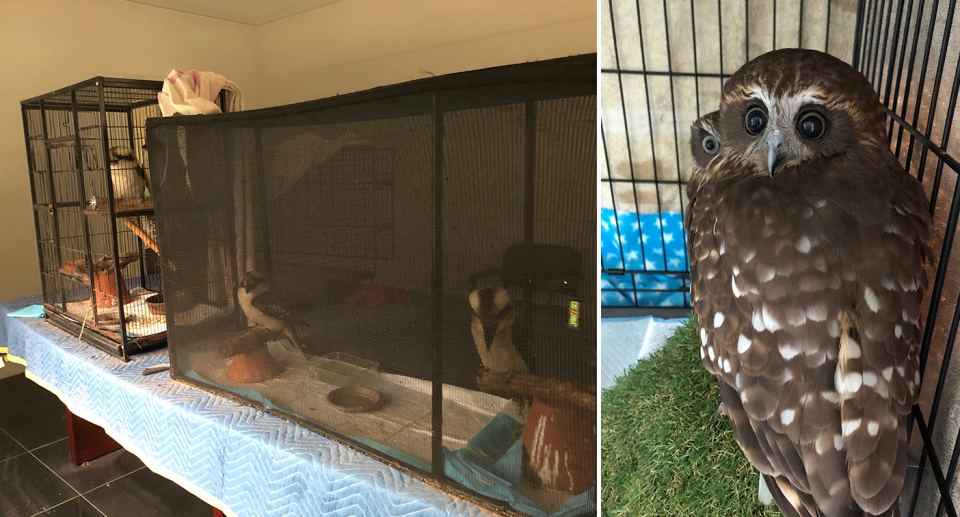'You don’t sweat when terrified': Inside the evacuation of Aussie zoo threatened by bushfires
Zoo animals evacuated from a wildlife park are being cared for by an army of volunteers across the suburbs.
With the Gospers Mountain fire threatening Australia Walkabout Wildlife Park in Calga, 48km north of Sydney, a group of experienced carers offered to share their homes with kangaroos, owls, snakes and other native animals.
Park manager Tassin Barnard told Yahoo News Australia the animal locations needed to remain confidential.
“Having animals in care in the suburbs it’s really important to maintain confidentiality to ensure security,” she said.
“I mean one of the parks had two emus stolen a few years ago, how do you steal an emu?”
With the fire threat closing the park, they have no income coming in and Ms Barnard is fundraising to help feed their hungry menagerie.


Staff have been working countless hours of overtime and some are even donating their salaries back to the park, but they urgently need donations.
“We’re not a big zoo with a big bank balance, we don’t have savings to draw on,” Ms Barnard said.
“We’re literally running on credit and community goodwill at the moment.
“We not only need to get back to operating but we also need to put in some seriously expensive equipment to make sure next summer we are safe.”
‘You stop being thirsty, you stop being hungry’
Despite evacuating the animals in her care, Ms Barnard has refused to leave the remaining wild creatures that live in the forest at her beloved park.
She has slept very little since November 17 when she began directing more than 100 people, many of them from Wildlife ARC and WIRES, who volunteered to help.
“Three weeks ago, [we] realised that the fire could get to us in two days,” Ms Barnard said.

“That fight or flight response is designed to carry you through a problem that might last an hour, it’s not designed to carry you through a problem that might last a few weeks.
“Yet, that’s actually how I function.”
Ms Barnard organised the volunteers in ways that played to their strengths and found those with little experience excelled because they were eager to learn.
“I became the delegation super power, because I realised if there was something worrying me, I had to give it to someone else to deal with,” she said.

“I had to focus on what that fire might do and what the people could do to help us get these animals out of danger.
“That required hyper focus.”
With volunteers focused on their tasks, it was important to ensure everyone was taken care of.
“You stop being thirsty, you stop being hungry, you stop sweating,” she said.

“I know people say you sweat when you’re scared, you don’t sweat when you’re terrified.
“Everything just shuts down and you just focus on what matters.”
By day three, burnt leaves were falling from the sky and the fire was within 20km of the park.
“The smoke was unbearable,” she said.
“Trying to work in incredibly hot weather with a mask over your face is really difficult as well, but we all got quite good at it after a while.”
Returning the zoo animals to the park
Three weeks on, with much of the bush surrounding the park burnt and containment lines strengthened, it is now time for park staff to consider returning some of the animals.
Away in care for weeks, some of them are beginning to show signs of frustration and need to “urgently” be returned.

“The first ones that need to come home are the dingoes,” Ms Barnard said.
“They have a very strict pack hierarchy and just as of two days ago we started to see some behaviours could be a bit worrying.
“The young female attacked the old female.
“They’re fine, but she was trying to say, ‘Hold on a second you’re not the boss of me’.”
Revealed: The biggest challenge to saving fire-ravaged koala population
Former roo shooter 'paying her penance' by caring for joeys dying in bushfires
Bushfire ravaged town's heartfelt plea to the rest of Australia
'Absolute tragedy': Koala numbers decimated after bushfires destroy key habitats
Heroic rescuer reveals why koala hospital had no choice but to put Lewis to sleep
Ms Barnard believes the experience of evacuating the park will have them better prepared next time a “mega fire” approaches.
Wallabies and emus showed the most alarm when the smoke started blowing in, while dingoes can be calmly walked out on leads.
She believes the ongoing blazes across NSW and Queensland have changed Australia forever.
Bushfires will now be a part of life for people living near forested areas and they will need to learn to adapt.
The park will likely open next week and Ms Barnard hopes visitors will rally behind it in the same way the community did when the park was in need.
The author, Michael Dahlstrom, is a registered wildlife carer in NSW with Wildlife ARC.
Do you have a story tip? Email: newsroomau@yahoonews.com.
You can also follow us on Facebook, Instagram and Twitter and download the Yahoo News app from the App Store or Google Play.




